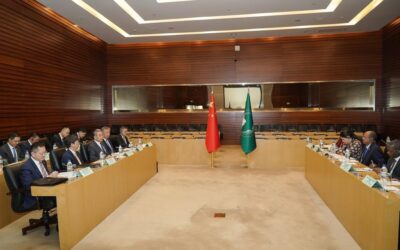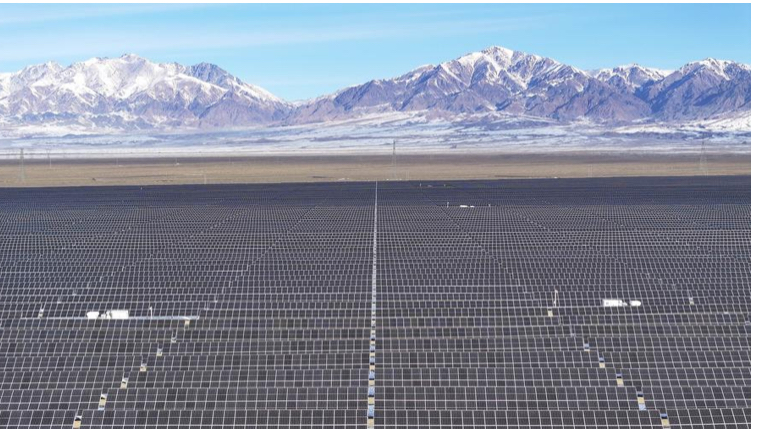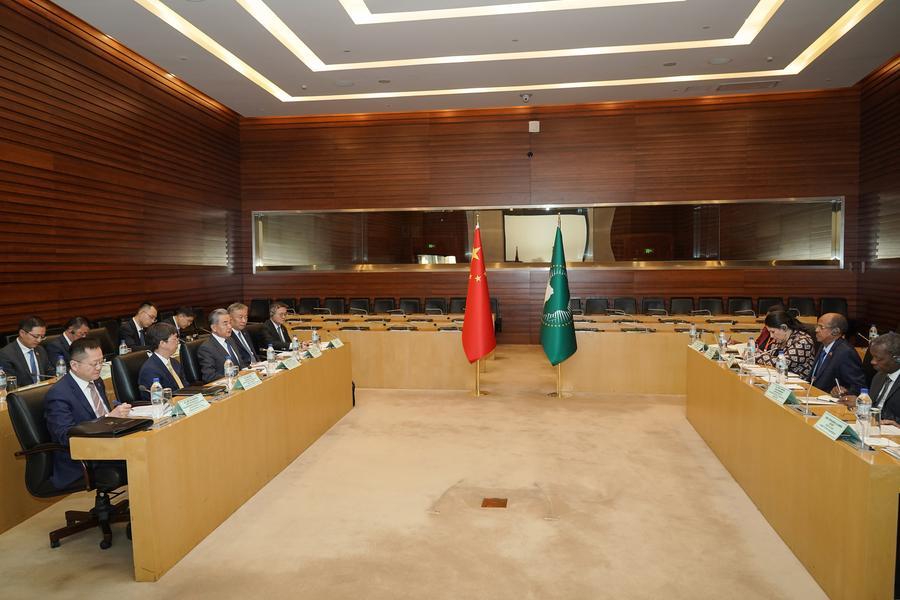A partial view of the Shichengzi photovoltaic power station in Hami City, northwest China’s Xinjiang Uygur Autonomous Region, January 6, 2025. /Xinhua
At the United Nations Climate Summit 2025 in New York during the UN General Assembly on September 24, Chinese President Xi Jinping delivered a video message that resonated well beyond the halls of the UN. Speaking on the 10th anniversary of the Paris Agreement, Xi called on countries to strengthen confidence, assume responsibility and embrace cooperation in tackling climate change, the defining challenge of our time.
In concrete terms, Xi announced that China will cut its net greenhouse gas emissions by 7 to 10 percent from peak levels by 2035. He further pledged to raise the share of non-fossil fuels to over 30 percent of China’s total energy mix, while expanding wind and solar power capacity to six times their 2020 levels, reaching an unprecedented 3,600 gigawatts. In addition, China will expand its national carbon trading system and increase its forest stock volume to 24 billion cubic meters. These steps underscore not only ambition but also accountability in global climate governance.
For the first time, China has committed to absolute reductions in emissions. This marks a milestone in global climate diplomacy, demonstrating that China is prepared to assume its share of responsibility while also supporting the development needs of others.
Xi’s speech highlighted three guiding principles. First, confidence. Green transformation, he said, is the trend of our era. Despite challenges, the world must maintain determination and momentum in implementing new national commitments. Second, responsibility.Developed nations, he urged, should lead in emission reductions while providing financial and technological support to developing countries, in line with the Paris Agreement principle of “common but differentiated responsibilities.” Third, cooperation. Xi stressed the importance of open trade and collaboration in green industries, ensuring that clean technologies and the benefits of green growth are shared globally.
These are not abstract ideas. Already, China leads the world in renewable energy deployment, accounting for more than half of global investment in solar and wind power over the past decade. Its rapid expansion of electric vehicles and clean infrastructure has helped drive down the global cost of green technology, making the energy transition more accessible for all nations.
International leaders welcomed this constructive spirit. UN Secretary-General Antonio Guterres praised the progress made under the Paris Agreement, noting that global projections for temperature rise have already dropped significantly thanks to national commitments. But he also emphasized that the world must move “much further, much faster” to secure a livable future.
By placing cooperation at the heart of his message, Xi underscored that climate change is not a competition but a shared responsibility. His call aligns with the urgent appeals of vulnerable nations, from low-lying island states to climate-stricken regions of Africa and Asia, that the benefits of green development must be truly global.
Crucially, Xi’s remarks serve as a reminder that leadership in the 21st century is not only about economic or military strength, but about the ability to galvanize action on issues that transcend borders, such as climate change. It threatens communities in every hemisphere, but it can also unite nations through shared purpose. By advancing ambitious renewable energy goals, promoting forest conservation and expanding carbon trading, China is showing that leadership means turning vision into concrete pathways for change.
Stephen Ndegwa, a special commentator for CGTN, is the executive director of South-South Dialogues, a Nairobi-based communications development think tank.








Manche Echtgeld Boni ohne Einzahlung kann man auch für Tischspiele einsetzen.
Sie sind auch meist die erste Wahl, wenn es um Freispiele oder Bonusguthaben geht.
Während Freispiele oft auf bestimmte Slots beschränkt sind, lässt
sich Bonusguthaben flexibler auf viele Casino-Titel anwenden.
Die Mindesteinzahlung wurde bei allen Zahlungsmethoden auf 20 Euro festgesetzt.
Das Zeitlimit zum Erfüllen der Umsatzbedingung beträgt fünf
Tage und maximal kann lediglich der fünffache Betrag des erhaltenen Bonus ausgezahlt werden. Bei den ersten beiden Einzahlungen müssen mindestens 10 Euro, bei der
dritten mindestens 20 Euro und bei der vierten mindestens 15 Euro eingezahlt werden, um die Bonusprämien zu erhalten. Die
Verde Casino Freispiele können zum Beispiel lediglich bei dem vorgegebenen Spielautomaten eingelöst werden, während man mit dem Startguthaben etwas mehr Auswahl hat.
Dies bedeutet selbstverständlich auch, dass man echtes Geld gewinnen kann.
Der umfangreichste und gefragteste Bonus im Verde
Casino ist der Willkommensbonus. Eine weitere Aktion ohne Einzahlung bietet
das Casino Verde als 25 Euro No Deposit Bonus an. Der Verde Casino
50 Freispiele Bonus ist direkt nach der erfolgreichen Verifizierung des Kontos erhältlich und kann
für den Slot Book of Sirens genutzt werden. Aus diesem Grund gehören Freispielaktionen ebenfalls zu den gefragten Bonusangeboten, die Online Casinos zur Verfügung stellen. Sie erhalten in diesem Fall 50 kostenlose Drehungen, ohne eine Einzahlung vornehmen zu müssen. Um den 10 Euro Bonus
ohne Einzahlung zu erhalten, müssen Sie sich im Casino registrieren.
References:
https://online-spielhallen.de/stakes-casino-cashback-ihr-weg-zu-mehr-spielguthaben/
I don’t think the title of your article matches the content lol. Just kidding, mainly because I had some doubts after reading the article. https://accounts.binance.com/da-DK/register?ref=V3MG69RO
This feature is ideal for beginners who want to understand the mechanics and experience the gameplay without financial risk.
The RTP ranges from 88.20% to 98.98%, allowing players to choose between high and low stakes based on their preferred strategy.
By raising the stakes only when on a winning streak, players capitalize on their gains while limiting risk.
In the Parlay strategy, players increase their bet after each win rather than after a loss.
The Martingale strategy is a classic betting approach where
players double their bet after each loss. This attention to detail enhances the overall
appeal and keeps players entertained as they watch each drop unfold.
Player2 couldn’t believe their eyes when a casual evening gaming
session resulted in a $43,500 windfall. ✨ The satisfying
sound of the puck dropping through the pegs has become the soundtrack to
success for many of our most celebrated winners. Pretty fair compared to many games, right?
Your choice of pin density and betting style can influence this experience significantly in Plinko.
The 98% RTP of Plinko casino is quite generous in the gambling world,
but remember – Lady Luck doesn’t care about
statistics during your two-hour gaming session! Anything can happen – that’s
the thrill of the game!
Its presence in casinos and online gambling platforms
underscores its widespread appeal. Really liked it, Plinko good
slot in online casinos! I play every day on the road in transport, I confess –
I love casinos and slots. Whereas in many other popular casino games, the RTP is only
95-97%. Now you see why Plinko has a high popularity among fans of online casinos around the world.
The ball will appear on top and begin its way to the coveted multipliers, facing an obstacle,
but rapidly following its goal.
By adding native and adaptive vegetation, using rainwater
capture for toilet flushing, and installing efficient fixtures and irrigation, the campus
is projected to save more than 20 million gallons of water each year.
The all-electric buildings are completely fossil-fuel free, drawing renewable energy
from off-site sources and the campus’s Thermal Energy Center, which houses a geothermal
system that provides heating and cooling for 18 buildings.
Since Microsoft established its headquarters
in Redmond, Washington, in 1986, the company’s campus has
grown from four buildings to more than 100. The Pedestrian Bridge
connects Microsoft’s East and West Campus, creating a
direct connection between the distinct areas of campus
while also eliminating the need for cars to traverse campus.
Though Pro Football Focus grades are hardly a be-all, end-all,
they did show a significant downturn for Detroit’s offensive line.
But Mahogany missed time, too, sending little-used
backup Kayode Awosika to guard. Johnson, of course, had the added benefit of one of the NFL’s best offensive lines.
Johnson’s attack was the most efficient, while Campbell’s
has produced more big plays — though it’s too small of a sample size to draw any significant conclusions.
References:
https://blackcoin.co/6_vip-casino-review-2022-special-bonuses-for-canadians_rewrite_1/
online casino paypal
References:
https://praylotto.kr/bbs/board.php?bo_table=free&wr_id=6
casino online paypal
References:
https://realestate.kctech.com.np/profile/briannamorrill
Woh I enjoy your articles, bookmarked! .
I have not checked in here for some time since I thought it was getting boring, but the last several posts are great quality so I guess I’ll add you back to my everyday bloglist. You deserve it my friend 🙂